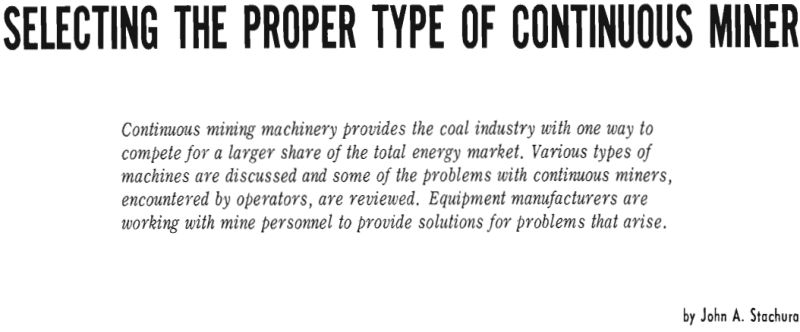While coal production over the past 25 or 30 years has been on a horizontal plane, coal’s share of the total energy market has declined. To participate more effectively in this total energy market, it is necessary to produce coal more efficiently. It is the obligation of all management, employees, and mining departments to gear the deep mining industry to the rapid progress and changing of today’s modern industry. This can be accomplished in the near future with the selection of the proper type of continuous miner best suited to each operator’s individual situation.
Before discussing details regarding the selection of a continuous miner, let us have a preview of some of the continuous mining machines which are available to the coal industry today. Jeffrey Manufacturing Co.: The machine shown is the Jeffrey 76 A.M. Colmol.
Jeffrey 76 B.M. Colmol: This machine is similar to the 76 A.M. model; however, it is built bigger and stronger for a mining range of 50 ½ to 72 in.


86 A Colmol: This machine is designed exclusively for low coal. It will work in seams as low as 28 in. mining a width of 14½ ft. The maximum mining height is 44 in., this being accomplished by addition of 18-in. radius breaker arms.
The gathering chain complete with cutter bits cuts the remaining coal and provides a smooth bottom for the machine. These chains running in opposite directions also gathers the coal and discharges it on to the main conveyor. The mining principle is similar to the 76 A Colmol.
The overall construction has provided for difficult mining conditions and many features make inspection, upkeep, and maintenance much easier than many earlier models. This machine operates with one 250 hp motor.
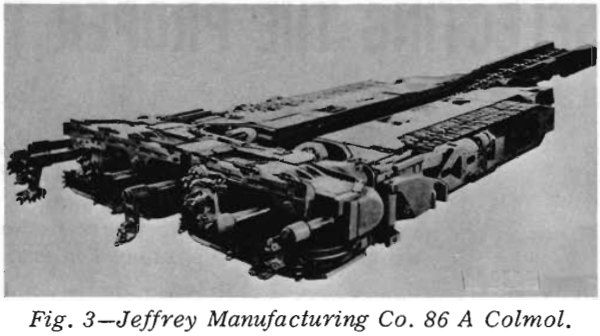

Lee Norse Miners: The first Lee Norse miner was put into operation in January 1952, and by the end of 1955 they had ten continuous miners in service. Today there are more than 200 Lee Norse miners in operation. Their outstanding achievement is the fact that all of these machines, with the exception of the rubber-tired prototype machines, are still in service with the original purchasers.
Joy Manufacturing Co.: In its very wide selection of continuous miners this company has basically
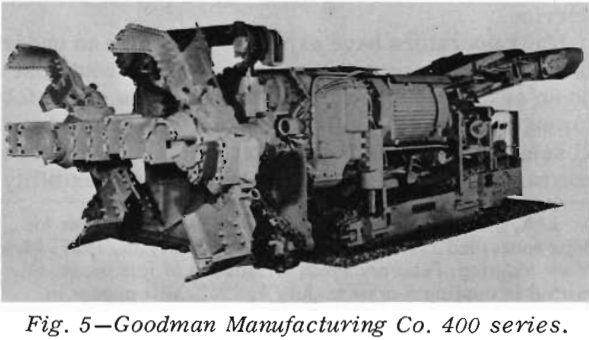

three specific categories. First, the numerous types of ripper bar machines; second, the twin bore; and third, the Rotobuster.
Operation — The Rotobuster sumps into the face on crawlers to the desired distance—usually about 30 in. The sump is made along the rib with the end-cutter boring into the coal. Then, powered by strong hydraulic jacks, the mining head sweeps across the face. The fast-turning end-cutter drills a path deep in the face, while the slower rotating drum-cutter breaks the coal and moves it out with its augerlike flights. When the head reaches the opposite rib, the mining head shears up to the roof line, then begins another sweep back across the face. Hydraulic cylinders automatically keep the head parallel to the floor during the shear, but the operator may tilt the head for cutting over rolls. Only one sump is made. Rooms 14 to 20 ft wide may be mined in 32 to 48-in. seams.

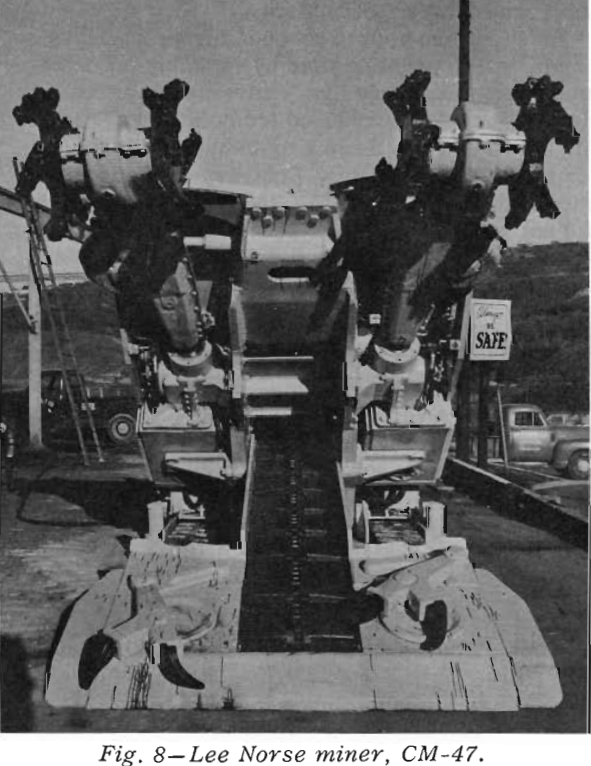
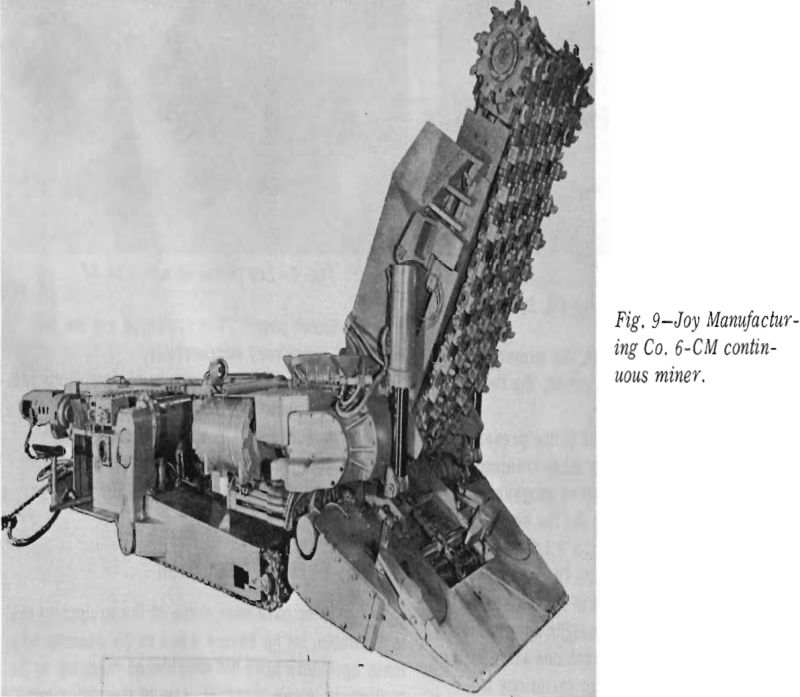
Today we are able to produce higher tonnages and obtain more operating time by reducing bit damage and change time under very adverse seam conditions. Bit cost was reduced from an average of 27¢ for the first three months to an average of 7 ½¢ for the past five months.

Seam thickness has also been a major reason for staying away from the continuous mining program. Today this is no longer true. Low machines are available in auger, ripper bar, and bore-type machines. In numerous areas, reports indicate that they are able to work successfully in seams as low as 28 in.

If there could be one phase of the continuous mining program where the greatest improvement has been made, it would be in the maintenance department. Manufacturers are aware that initial cost, although being important, is very secondary to long life between overhaul programs, maximum operating time, ease of operations, and an absolute minimum of down-time due to mechanical breakdowns.
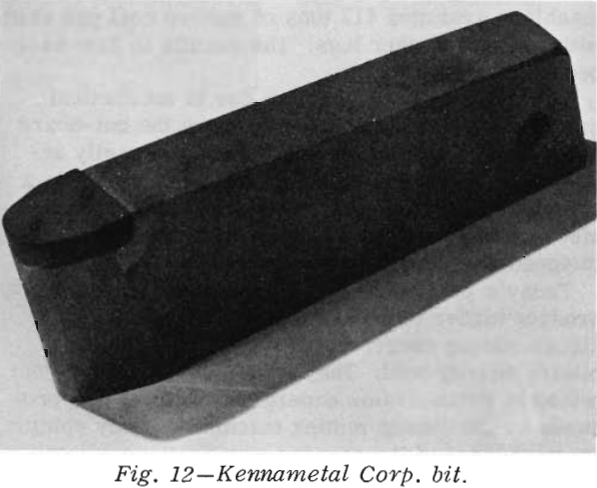
Roof Control: To date the problem of roof control while mining coal in the same working face has been one of the major drawbacks to the continuous mining program. While some progress has been made there has been no real satisfactory solution.
Changing from conventional mining to continuous mining, in addition to requiring a large financial outlay, requires courage and a deep desire on the part of the mine management to be progressive. We must be aware that mining methods and equipment become obsolete at a much greater rate today than in previous years. Too, mine management must have patience and must be willing to devote long hours each day for several months before the benefits begin to show on the financial statement and in the safety department. In this connection our experience has taught us that a gradual changeover greatly simplifies management’s job when a change is being made.
